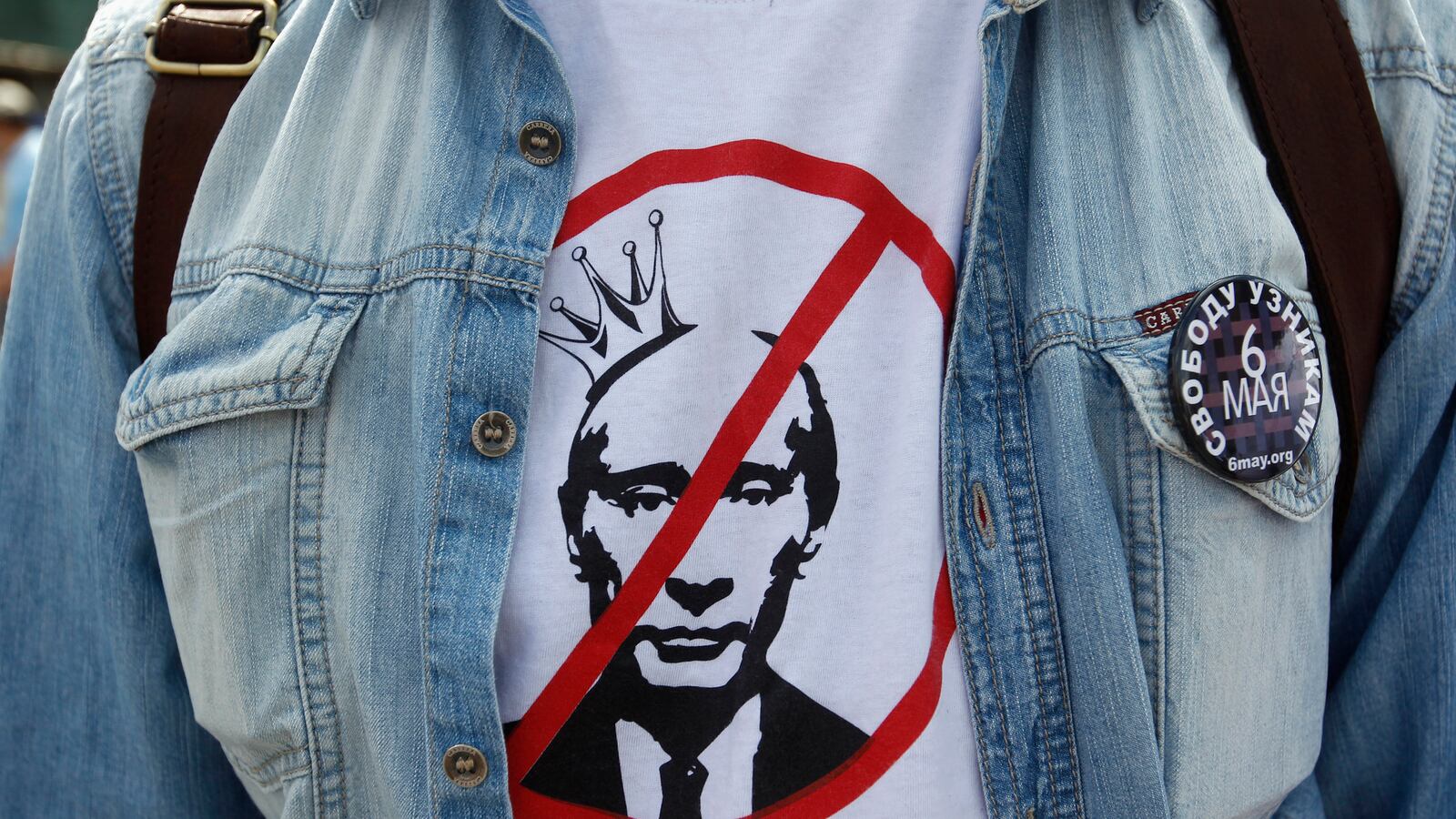A political joke made the rounds of cynical Muscovites during the early 1980s, a time when the Soviet Union was fighting its war in Afghanistan, pressuring the Polish communist government to declare martial law and outlaw the Solidarity movement, and incessantly complaining about how the United States and NATO were responsible for the tense state of East-West relations.

Question: What is the most aggressive country in the world?
Answer: The United States.
Question: Why?
Answer: Because it interferes in the Soviet Union’s internal affairs all over the world.
Fast-forward to Russian President Vladimir Putin’s seizure of Crimea and the ensuing violence and upheavals in Ukraine’s eastern regions, coupled with the Kremlin’s steady drumbeat of threats that it reserves the right to “protect” Russians and Russian speakers there. All you need to do is sub the word “Russia” for “Soviet Union” and the joke still packs the same punch. It’s an equally funny-sad commentary on where we are today.
To be sure, Putin’s tone has changed a bit in recent days. But he continues to proclaim, in all solemnity, that “the rights” of all Ukrainian citizens must be protected, a not-so-thinly disguised threat of more Russian strong-arm tactics in the future. And there is still no doubt that his No. 1 priority is that Ukraine’s new experiment with democracy ends in failure. Otherwise, Putin’s own countrymen may start questioning the corrupt Kremlin autocracy that is presiding over a weakening and increasingly vulnerable economy.
What’s more sad than funny today is that Putin still gets some traction with his argument that Russia is genuinely concerned with anyone’s human rights. Or that its behavior, however egregious, is understandable given Russia’s alleged mistreatment at the hands of the West.
Largely cut off from anything but the propaganda spouted by newspapers, TV and radio, many ordinary Russians accept this worldview. That’s hardly surprising. Those who don’t have largely been silenced for now—or, I suspect, reduced to resorting to the same kind of black humor that I used to hear in the apartments of cynical Muscovites in those Cold War days.
Far more troubling is the fact that some people in the West still accept part of Putin’s victimhood narrative, even when condemning his actions. So it’s worth reminding ourselves of how patently false that narrative is, and how deeply rooted it is in Soviet-era thinking.
First, there’s the argument that NATO expansion in the 1990s and early 2000s was threatening to Russia, feeding its paranoia. After all, didn’t the United States support the expansion of NATO eastwards? When Russia invaded Georgia in 2008, New York Times columnist Tom Friedman proclaimed this proved he and others were right to oppose NATO expansion from the start—and today, as he sees it, Ukraine proves him more right than ever.
“The decisions by the Bush I and Clinton teams to expand NATO laid the seeds of resentment that helped to create Putin and Putinism,” Friedman wrote in a recent column. This echoes the it’s-all-the-West’s-fault standard refrain of Katrina vanden Heuvel and Stephen Cohen, who wrote in The Nation last month, that “twenty years of NATO’s eastward expansion has caused Russia to feel cornered.”
The fundamental flaw in that argument is that NATO does not threaten a Russia that is willing to live in peace with its neighbors. The reason the former subjects of the Soviet empire were eager for NATO membership in the first place, of course, was that no one trusted Russia to remain peaceful indefinitely. But one of the byproducts of NATO membership for a country like Poland was its growing willingness to explore a more positive relationship with Russia, allowing historical enmities to fade. Putin’s current course means that’s no longer possible.
And just imagine for a moment that Poland and the Baltic states were not part of NATO today. Whatever their nervousness about Russia’s current course and how far west it intends to push, those countries would be feeling 10 times more threatened and vulnerable than they are now. That would be a recipe not just for Ukrainian instability but for instability and upheaval throughout the entire region.
If the West had denied NATO membership to the new democracies of the region, this would have been a clear signal that it does not believe that any former part of the Soviet Empire is free to determine its own course. It also would not have changed the Russian narrative. As the old political joke indicates, even when the Soviet Union was intact and its empire encompassed half of Europe, the Kremlin line was that it was “encircled” by the hostile West. In fact, the bigger its empire, the more encircled it claimed to be. That, in theory, justified its military buildup and the hardships endured by its citizens—everything from chronic food shortages and the dismal standard of living to the suppression of free expression of any kind.
If Putin wants to keep spinning that tale in order to justify his increasingly draconian rule and his aggressive behavior, especially with an eye to his weakening economy and the likely long-term erosion of popular support for his government, so be it. But it’s time to recognize that his narrative is nothing else but warmed-over Cold War propaganda. No one should have fallen for it then; no one should fall for it now.
Granted, there is one new twist to this story. Today, Putin adds the European Union, that oh-so-threatening organization, to the alignment of forces seeking to encircle his country. It, too, is interfering in Russia’s internal affairs all over the world.






